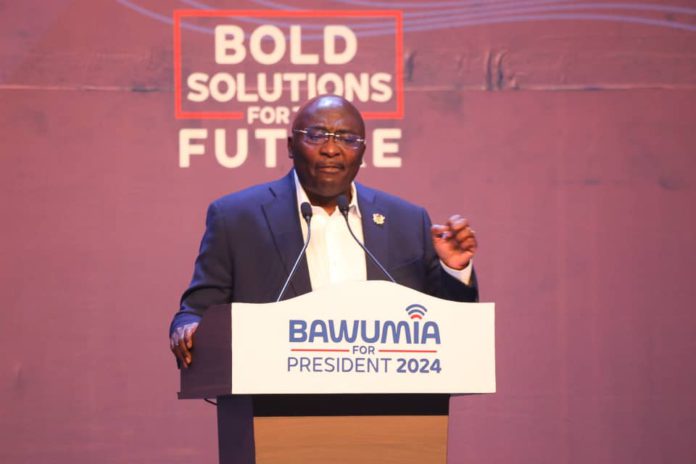
Vice President Dr. Mahamudu Bawumia says key economic indicators point to a better economic performance by the government than that of the period 2013-2016 led by former President John Mahama.
He says this achievement is despite the domestic and global crisis experienced between 2020 and 2022.
The success story, he said, is borne out by indicators such as GDP growth, agricultural growth, industry growth, trade balance, exchange rate depreciation, lending rates, gross international reserves and jobs.
In a lecture marking his first major public comments following his election as the flagbearer of the ruling New Patriotic Party, Dr. Bawumia called the economic performance as “good news”, saying that “the data shows that the economy is recovering from the crisis we faced.
“Inflation has declined from 54% in January to 23% in December 2023. Economic growth is rebounding, spending is under control with the fiscal deficit as a percentage of GDP has declined from 10.8% in 2020 to 4.2% in 2023. The debt to GDP ratio, after increasing from 61.2% in 2019 to 76.6% in 2021 has declined to 66.4% in 2023. And exchange rate depreciation has also slowed down sharply since February 2023, Whereas the exchange rate depreciated by 30% in 2022, between February and December 2023, it only depreciated by 9%.”
According to Dr. Bawumia, Ghana’s GDP growth averaged 3.9%, but it increased to an average of 5.3% between 2017-2020.
“Following COVID-19 and the global slowdown, Ghana’s GDP growth declined to an average of 4.9% between 2017 and 2022. What is remarkable about this performance is that notwithstanding the global economic crisis from COVI-19 and the Russia-Ukraine war, economic growth under our government is still stronger on average than under the 2013-2016 era preceding our coming into office.”
On Agricultural Growth, the Vice President said a stronger GDP growth performance in the 2017-2022 period is underpinned by a strong agricultural GDP growth which increased from an average of 2.9% between 2013-2016 to an average of 6% (double) between 2017 and 2022. We have made a lot of progress in agriculture even though there is more to be done. Rice imports for example have declined by 45% (from 805,000MT to 440,000MT) between 2021 and 2023! The goal is to be a net exporter of rice by 2028. It is clear that some of our policy interventions such as planting for food and jobs have born fruits.”
He said Industrial GDP growth also followed a similar trend and that after averaging 3.3% between 2013 and 2016, it increased to an average of 7.5% between 2017 and 2020.
“Industrial Growth however declined after the global crisis with a recorded average growth rate of 5% between 2017 and 2022. Again, what is remarkable about this performance is that notwithstanding the global economic crisis from COVI-19 and the Russia-Ukraine war, industrial growth under our government is still stronger on average than under the 2013-2016 era,” explaining that the government’s programmes and policies “such as the revival of Anglogold Ashanti (Obuasi mine), revival of Ghana Publishing Company, revival of Ghanapost, revival of State Housing Corporation, revival of State Transport Corporation, IDIF, and the attraction of international automobile companies to Ghana, amongst others have clearly yielded positive results.”

